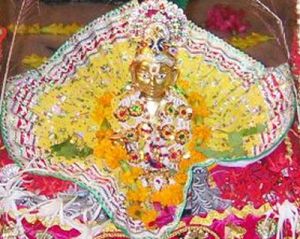 |
Origin of Bhagavata
Sri Vyasa was meditating on the sacred banks of the Sarasvati. His heart was in
a disturbed condition. He had no satisfaction and peace. He reflected within
himself, “I have observed strict Brahmacharya. I have paid due regard to the
study of the Vedas, to the worship of preceptors and sacred fires. I have obeyed
the commands of my preceptors. I have explained the meaning of the Vedas in the
form of the Mahabharata wherein Dharmas and other things can be clearly
understood by women, Sudras and others. Still I think my work is not fully
done.”
At this juncture Narada appeared before Sri Vyasa. Narada said, “You have fully
known all that is knowable. You have written the excellent Bharatam which
contains everything. How is it you feel uneasy and dissatisfied?”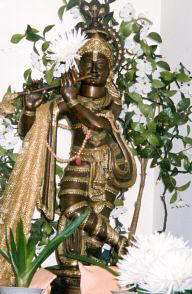
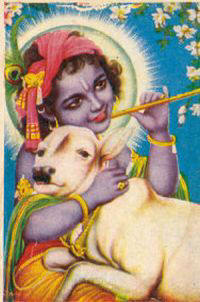 Sri Vyasa said, “I quite agree with what you say. Still I have no satisfaction.
I want to know the cause of it from you. You are born of Brahma and you possess
infinite knowledge.”
Sri Vyasa said, “I quite agree with what you say. Still I have no satisfaction.
I want to know the cause of it from you. You are born of Brahma and you possess
infinite knowledge.”
Narada said: “O great Muni! Thou hast treated of Dharma and other things but
thou hast not recited the glory of Vaasudeva. For this reason, I think, the Lord
is not satisfied. Therefore, O blessed one! write about the various glorious
deeds of Lord Krishna, so that all people may obtain the final emancipation by
knowing them. This universe is also an aspect of Bhagavan, because its creation,
preservation and dissolution proceed from Him. Thou knowest all this thyself.
But thou hast shown to others only a portion of this Truth. Therefore, O sage!
sing the glory of the Omnipresent Hari, by knowing which even the wise reach the
end of their quest. The wise know this alone and no other to be the remedy for
the miseries of beings that are repeatedly tossed into Samsara.” Thereupon Sri
Vyasa wrote Srimad Bhagavata and attained perfect peace of mind. He taught it to
his son, Suka.
The Bhagavata Purana
The Puranas hold a unique place in the history of religious literature of the
Hindus. They contain mine of knowledge and information on all philosophical and
religious topics. Srutis or Vedas cannot be easily understood by the common
people. So the all-merciful Vedavyasa composed the eighteen Puranas for the
benefit of mankind and explained in an easy way the subtle truth and the deep
problems of the Srutis. They are indeed an encyclopaedia of Hindu religion and
ethics.
The Puranas contain fables, fairy-tales, philosophy, religion, myth and legend.
A Western reader can hardly appreciate the teaching and value of our Puranas
unless he is conversant with the methods employed by the Indian Rishis in
inculcating the truths of philosophy and religion. The task of the Puranas is to
popularise the Vedic truths by means of narratives, stories and anecdotes.
Bhagavata is a practical guide for all. It teaches that God-realisation alone
can give salvation for man, and shows the ways to attain God-consciousness. It
teaches that God alone really exists and that God-realisation is the be-all and
end-all of life. It teaches us to realise God everywhere and always and in every
situation of life. It is indeed a wonderful book. It is a great treasure for
man.
Bhagavata is the solace of life. It is unique in its beauty and charm, in its
diction and philosophy. It is a valuable treasure-house of divine knowledge. A
study of this book inspires devotion, instills knowledge and Vairagya. The
glories of Lord Vaasudeva are vividly described in this book.
The author of this book is the great Vyasa. He taught this to his son, Suka.
There are many commentaries on this book. Sridhara Swami’s commentary is the
most famous and authoritative one.
The Bhagavata is the most popular and exalted of all Puranas. It is held in the
highest esteem by the Vaishnavas in all parts of India. It is a monumental work
amongst the devotional works which are the pride and glory of the Sanskrit
literature. Vyasa himself says that Srimad Bhagavata is the quintessence of that
gigantic work Mahabharata and it is the ripe fruit of the whole Vedic
literature.
It is the most favourite book with preachers and religious teachers. The book is
worshipped in all Hindu houses. It is recited all over India by learned Pundits,
Sadhus and Sannyasins.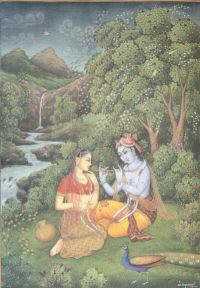
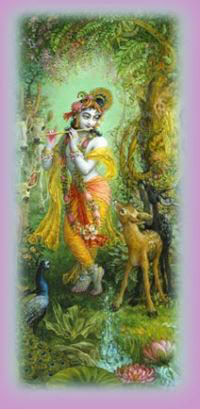
Jnana, Bhakti and Karma are assigned their respective places in this book. Karma
is prescribed for those who are very much attached to the body and this world.
Jnana is prescribed for those who are detached and dispassionate (Virakta).
Bhakti is prescribed for those who are neither very much attached nor very much
detached and who are indifferent. It teaches all about Bhagavata Dharma or the
religion of love.
All that is noble and inspiring in Hindu Religion, philosophy and culture is
found in Bhagavata. The highest truths of religion and philosophy and the
highest principles of ethics are beautifully explained in this marvellous and
unique book.
Attractive stories are a means employed by the Hindu Rishis and sages for
teaching morality, philosophy and religion. The author of the Bhagavata has
taken recourse to this method. The stories and anecdotes goad and lure the mind
to the truths of religion. They are like sugar-coated tablets. They serve the
purpose of entertaining the people of undeveloped minds.
Translation of this great book into a foreign language can never bring the charm
and beauty of the original, however erudite, skilful and powerful the translator
may be.
The Bhagavata consists of eighteen thousand Slokas, three hundred and thirty-two
chapters and twelve Skandhas. The book is named Bhagavata because it speaks of
the glory of Bhagavan or Vishnu. It is one of the most authoritative of Hindu
scriptures. It is a work of great repute in India. It exercises a direct and
powerful influence on the opinions and feelings of the people. It has acquired a
wonderful hold on the minds of Hindus. It contains the essence of all the
Puranas.
In Bhagavata Purana alone the history of the universe is systematically dealt
with.
Lord Krishna is the central figure of this unique book. It is an authoritative
book on devotion. Bhagavata teaches devotion that is associated with Jnana (Bhaktiytikta-Jnana).
It does not divorce knowledge from Bhakti. It teaches that Jnana is extremely
helpful to its perfect attainment. In Bhagavata the treacle of Bhakti is mixed
with the elixir of Jnana.
The teachings given by Lord Krishna to Uddhava on the eve of His departure from
this world, are wonderful. These are contained in the eleventh Skandha. Sri
Krishna clears all the doubts of Uddhava, His friend, foremost disciple and the
chief of the Yadavas. He gives instructions on a variety of subjects. But the
one ringing note is: “See Me in everything. Surrender yourself to Me. Do all
actions for my sake. Cut off all sorts of attachments. Have perfect unswerving
devotion to Me. Sing My glories.”
The Bhagavata Dharma as taught by the nine sages to King Nimi in the beginning
of the eleventh Skandha, is thrilling and soul-stirring. The tenth Skandha
contains all the Lilas of the Lord. The youthful sports and pastimes, the funs
and frolics of the divine child Sri Krishna, Kumara Lilas, Brindavan Lilas,
Mathura Lilas, Dwaraka Lilas, Kurukshetra Lilas and Prabhasa Lilas are described
in this Skandha. It contains 90 chapters.
The tenth Skandha cannot be understood by those whose hearts are filled with
passion and lustful tendencies. The aspect of lover and beloved found in every
religion cannot be comprehended by people who are immersed in worldliness. The
tenth Skandha contains the outpourings of the heart or the expressions of
rapturous love of the human soul when it is freed from the impurities of the
mind. When the impurities of the mind are removed, and the heart is thoroughly
purified, the human soul is naturally drawn or attracted towards the Lord and is
finally absorbed in Him.
The Bhagavata prescribes various kinds of meditation to suit different types of
aspirants. A beginner is asked to meditate on the Virat Purusha. He must think
that the whole universe is the body of the Lord. This is given in the second
Skandha. In the same Skandha and in the third also, meditation on the form of
the Lord in the heart, and on His various limbs beginning from the feet, is
described. In the eleventh Skandha meditation on the lotus of the heart with
three layers, Agni as the first, Surya as the second, and Moon as the third, one
over the other, is prescribed. In the same Skandha one is asked to meditate on
the form of Lord Krishna first, and then to fix the mind on ether or the supreme
cause, and finally to merge it in the Para-Brahman.
Bhagavata Saptahas are held all throughout India. The whole Bhagavata is recited
within seven days. This provides a good occasion for listening to and
understanding the whole of Bhagavata. You should conduct Saptaha in your house
once every year. This will contribute to your happiness and prosperity. Every
one of you should have a copy of the Bhagavata in your house.
Taken from "Lord Sri Krishna, His Lila & Teachings"- by Sri Swami Sivananda
Latest Additions.........
|
Sivananda Yoga (Yoga DVD) Diwali Prasad booklet - "Kanakdhara Stotram" ( Sanskrit/ Gujarati/ English) Divya Jivan (Gujarati)/ Aug-Sept 2018 / August -September 2017 (Special Issue) Atam Mahek (Gujarati) / Fragrance ( English) - Swami Adhyatmananda Vishnusahsranama - with meaning |
Yoga, A Way of Life - Sri Swami Adhyatmananda
"Yoga and Health" - a complete book with Question & Answer section by Sri Swami Adhyatmananda
Books on Yoga by Swami Adhyatmananda
"Amrut Putra" (Gujarati)
|
![]()
|
Please subscribe to Divyajivan Mailing List. We will update you with new uploads of spiritual literature on the web of Holy Master Sri Swami Sivanandaji Maharaj, saints of his lineage and other saints. We will also update you about the Sivananda Ashram, Ahmedabad website and facilitate communication with Sri Swami Adhyatmanandaji Maharaj. |
|
To manage your subscription, please visit Subscription Page. You can also subscribe and unsubscribe from this page. You may unsubscribe by yourself anytime you wish. You will be required to send confirmation link that you will get in your e-mail to complete this subscription. |
![]()
![]() Webmaster: webmaster@divyajivan.org
Webmaster: webmaster@divyajivan.org